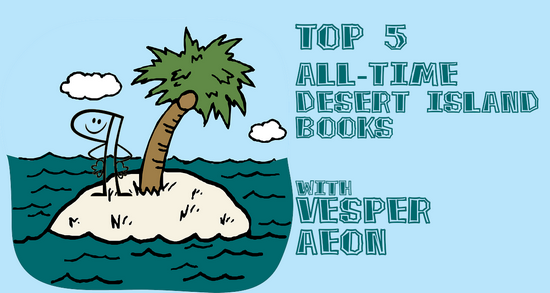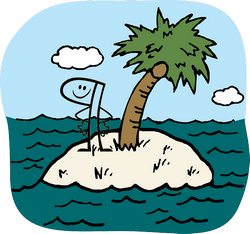
I couldn’t find much information about Vesper Aeon to provide this bio. Their webtoon The Epimethians is “an independent comic series about space marine mercs in the distant future”, which sounds promising. I really like their approach to this question.
A Desert Island Reading List
By Vesper Aeon
Everyone likes to ask the question of what you would take to read if you knew you were going to be stranded on a desert island for an extended period. It’s a valid question because we need novelty and distractions, otherwise our minds turn inward, and a proper reading list would help guide our thoughts. Compiling a good list, however, isn’t as easy as it sounds as I learned when I accepted this assignment.
In my youth there were certainly books I re-read, especially The Martian Chronicles. They weren’t especially complex stories, but they were not only entertaining, but showed the author’s love for the stuff that he read as a child and how they were still affecting him as an adult. Now, as an adult, I don’t find too many books that interest me enough to re-read them.
My ex-wife suggested I read Lady Chatterley’s Lover, which was one of her favorites, and we came away from it with very different understandings of the story. Likewise, she loved The Plague Dogs and, while I agree the book has a lot going for it, I felt that the ending was changed by the Editor who decided that it needed something more upbeat than what the author had intended. But I don’t think I could, or would need to, read either of those more than twice.
So, what would I take? I don’t want to give joke answers, and I’d also prefer not to be cliché, but if I had to choose, then I suppose this is the list.
1. The Bible: King James Version
Let’s be clear, I’m not bringing this because I’m especially religious, I’m not. But you would be hard-pressed to find any volume in the world that has had a greater impact on human civilization, for good or ill. Everyone and their mother want to hurl quotes at you, but let’s be honest here…how many people do you know who have actually read it?
The staff of the RPG company White Wolf Studios certainly did, and their takeaways were nothing less than fascinating, as shown in their interpretation of the story of Cain and Abel and the origination of the vampire.
2. Don Quixote
After 500 years people are still reading this epic tale, and it is highly celebrated in Cervantes’ native Spain. I tried reading it long ago, but there were so many passages in French, Italian, and German that I felt that by skipping them due to my inability to speak those languages, I was missing something crucial to the plot. If they weren’t necessary, why did Cervantes include them? And if they wouldn’t lose their meaning by being translated in Spanish, why didn’t he? Since I was reading “Don Quixote” in English, why wasn’t everything translated into English?
The reason, I supposed, was that Cervantes felt that these passages would lose something in their translation, and thus he refused to. With unlimited time, and a greater understanding of the fundamentals, I think I could make a better effort at it and might enjoy the book more.
3. The Bhagavad Gita
This is a book I had never even heard of until I saw it referenced, quite unfavorably, in Robert Heinlein’s classic “Stranger in a Strange Land”. Again, I’m not especially religious, but this holy book is over 2,000 years old and has influenced the lives of millions of people in India, one of the most populous countries on earth. Freed from the distractions of ordinary life I could finally settle in to study it and see what it has to offer and why Heinlein was so quick to dismiss it.
4. Finnegan’s Wake
I’ve heard this book referenced occasionally, including a blurb in the satirical newspaper The Onion. For those who are unaware, this book took James Joyce 17 years to write, and most people spend almost that much time reading it. Not because it’s boring, but because it defies conventional storytelling methods. Probably the only downside to reading it would be the lack of someone to share it with, which certainly aids in understanding anything.
5. The Koran
Despite my frequent protestations that I’m not religiously inclined, here I am adding a third holy text to this list.
Most of what I know about the Middle East was gained during my time as a student at the University of Washington, but my education was a mile wide and an inch deep. I gained a broad understanding of the history of the region, mostly in the post-WWI eras, but the best way to understand a culture is to explore their relationship with the Almighty. And this saves me from accusations of taking sides or ignoring one of the major religions of planet earth.
Is my list trite? I probably don’t know, but it’s honest, at the very least. If I had to remove the Bible and the Koran, I have other titles in mind, but I’ll save them for a future list.
Be sure to check out The Epimethians or its Twitter feed!

Image by Clker-Free-Vector-Images from Pixabay

